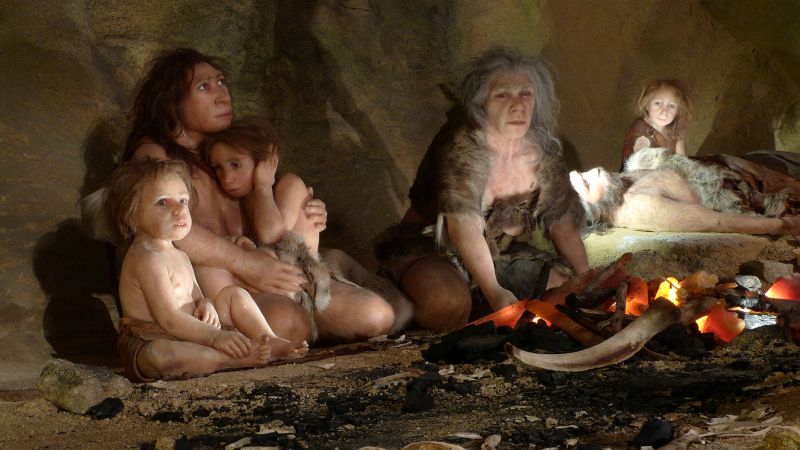Welcome to DU!
The truly grassroots left-of-center political community where regular people, not algorithms, drive the discussions and set the standards.
Join the community:
Create a free account
Support DU (and get rid of ads!):
Become a Star Member
Latest Breaking News
Editorials & Other Articles
General Discussion
The DU Lounge
All Forums
Issue Forums
Culture Forums
Alliance Forums
Region Forums
Support Forums
Help & Search
Science
Related: About this forumHow did Neanderthals disappear? New DNA analysis sheds light on the mystery
Science / Unearthed
How did Neanderthals disappear? New DNA analysis sheds light on the mystery
By Katie Hunt, CNN
6 minute read
Updated 9:19 AM EDT, Wed July 31, 2024

An exhibit in a Neanderthal museum in Krapina, Croatia, shows the life of a Neanderthal family in a cave. Nikola Solic/Reuters
Sign up for CNN’s Wonder Theory science newsletter. Explore the universe with news on fascinating discoveries, scientific advancements and more.
(CNN) — The 2010 discovery that early humans and Neanderthals once interbred was a scientific bombshell — the revelation of a genetic legacy that’s since been found to play a role in the lives of modern people, influencing circadian rhythms, immune system function and the way some feel pain. ... Scientists, however, have found it surprisingly hard to piece together gene flow in the opposite direction: how intermingling between the two groups may have shaped Neanderthals, who went extinct around 40,000 years ago. With the help of new techniques, a new study is painting a clearer picture.
The analysis, published July 12 in the journal Science, showed that the two groups exchanged DNA at multiple points over the past 250,000 years, shedding light on how Neanderthals disappeared and potentially rewriting the story of how and when our Homo sapiens ancestors left Africa.
“To date, most genetic data suggests that modern humans evolved in Africa 250,000 years ago, stayed put for the next 200,000 years, and then decided to disperse out of Africa 50,000 years ago and go on to people the rest of the world,” said Joshua Akey, a professor at the Lewis-Sigler Institute at Princeton University and senior author of the study. ... “But genetics is essentially blind to anything that doesn’t leave ancestry to present day populations. What I think (is) kind of cool about this (paper) is that it provides genetic insights into these dispersals out of Africa that we previously weren’t able to see,” Akey said.
The findings suggest that very early human history was complex, and modern humans likely interacted with Neanderthals — and other types of archaic humans, including the enigmatic Denisovans — much more frequently than previously recognized since our emergence as a species around 250,000 to 300,000 years ago.
{snip}
How did Neanderthals disappear? New DNA analysis sheds light on the mystery
By Katie Hunt, CNN
6 minute read
Updated 9:19 AM EDT, Wed July 31, 2024

An exhibit in a Neanderthal museum in Krapina, Croatia, shows the life of a Neanderthal family in a cave. Nikola Solic/Reuters
Sign up for CNN’s Wonder Theory science newsletter. Explore the universe with news on fascinating discoveries, scientific advancements and more.
(CNN) — The 2010 discovery that early humans and Neanderthals once interbred was a scientific bombshell — the revelation of a genetic legacy that’s since been found to play a role in the lives of modern people, influencing circadian rhythms, immune system function and the way some feel pain. ... Scientists, however, have found it surprisingly hard to piece together gene flow in the opposite direction: how intermingling between the two groups may have shaped Neanderthals, who went extinct around 40,000 years ago. With the help of new techniques, a new study is painting a clearer picture.
The analysis, published July 12 in the journal Science, showed that the two groups exchanged DNA at multiple points over the past 250,000 years, shedding light on how Neanderthals disappeared and potentially rewriting the story of how and when our Homo sapiens ancestors left Africa.
“To date, most genetic data suggests that modern humans evolved in Africa 250,000 years ago, stayed put for the next 200,000 years, and then decided to disperse out of Africa 50,000 years ago and go on to people the rest of the world,” said Joshua Akey, a professor at the Lewis-Sigler Institute at Princeton University and senior author of the study. ... “But genetics is essentially blind to anything that doesn’t leave ancestry to present day populations. What I think (is) kind of cool about this (paper) is that it provides genetic insights into these dispersals out of Africa that we previously weren’t able to see,” Akey said.
The findings suggest that very early human history was complex, and modern humans likely interacted with Neanderthals — and other types of archaic humans, including the enigmatic Denisovans — much more frequently than previously recognized since our emergence as a species around 250,000 to 300,000 years ago.
{snip}
InfoView thread info, including edit history
TrashPut this thread in your Trash Can (My DU » Trash Can)
BookmarkAdd this thread to your Bookmarks (My DU » Bookmarks)
2 replies, 844 views
ShareGet links to this post and/or share on social media
AlertAlert this post for a rule violation
PowersThere are no powers you can use on this post
EditCannot edit other people's posts
ReplyReply to this post
EditCannot edit other people's posts
Rec (15)
ReplyReply to this post
2 replies
 = new reply since forum marked as read
Highlight:
NoneDon't highlight anything
5 newestHighlight 5 most recent replies
= new reply since forum marked as read
Highlight:
NoneDon't highlight anything
5 newestHighlight 5 most recent replies
How did Neanderthals disappear? New DNA analysis sheds light on the mystery (Original Post)
mahatmakanejeeves
Aug 2024
OP
58Sunliner
(4,987 posts)1. I find this fascinating. Netflix has a special on the Neanderthals.
AllaN01Bear
(23,194 posts)2. a late friend of mine would have hours long disscussions on this . fascinating. raises eyebrows .